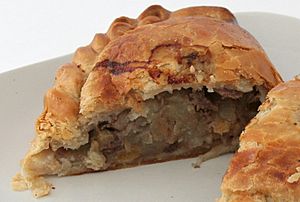Pastygate facts for kids
Pastygate was the name given to a small political argument in the United Kingdom in March 2012. It happened when the government suggested adding a new 20% tax, called VAT, to hot pasties.
A Member of Parliament (MP) from the Labour Party asked George Osborne, who was the Chancellor of the Exchequer (a very important financial minister) from the Conservative Party, when he last ate a Cornish pasty. Mr. Osborne said he couldn't remember. Many people thought this showed that the Conservative Party was not connected to the lives of everyday people.
Later, the Prime Minister, David Cameron, said he had recently eaten a Cornish pasty at Leeds railway station and that it was "very good." However, a newspaper called The Sun reported that you couldn't actually buy Cornish pasties at Leeds railway station at that time.
What started as a small issue soon became a big topic in newspapers and among political experts. They pointed out that the Conservatives seemed to misunderstand that pasties were a common food for many ordinary people. The new tax would affect both the customers who bought pasties and the businesses that made them. Newspapers and commentators made fun of David Cameron's story and George Osborne's lack of knowledge about pasties.
Contents
What Was Pastygate?
Pastygate was a political argument that happened in the UK in March 2012. It got its name because it was about a new tax on hot pasties. A "gate" ending is often added to the names of political scandals, like "Watergate" in the United States.
The Pasty Tax Idea
The government planned to add a 20% tax, known as VAT, to hot takeaway foods. This included hot pasties. Before this, hot pasties were not taxed in the same way. Many people were upset because pasties are a popular and affordable meal for many.
Politicians and Pasties
During this time, a Labour MP asked George Osborne, the Chancellor of the Exchequer, about his pasty-eating habits. Mr. Osborne said he didn't know when he last ate one. This made him seem out of touch with regular people.
Then, Prime Minister David Cameron tried to show he was more connected. He said he had recently enjoyed a Cornish pasty at Leeds railway station. But a newspaper quickly reported that there were no Cornish pasties sold at that station at the time he claimed. This made his story look untrue.
Media Reaction
Even though it seemed like a small thing, the "pasty tax" and the politicians' comments became a big story. Newspapers and political experts talked about how the Conservative Party seemed to misunderstand the lives of ordinary people. They highlighted that the tax would hurt both customers and the pasty-making businesses. The media also made fun of the politicians' attempts to appear like regular pasty eaters.
Images for kids
 | John T. Biggers |
 | Thomas Blackshear |
 | Mark Bradford |
 | Beverly Buchanan |



